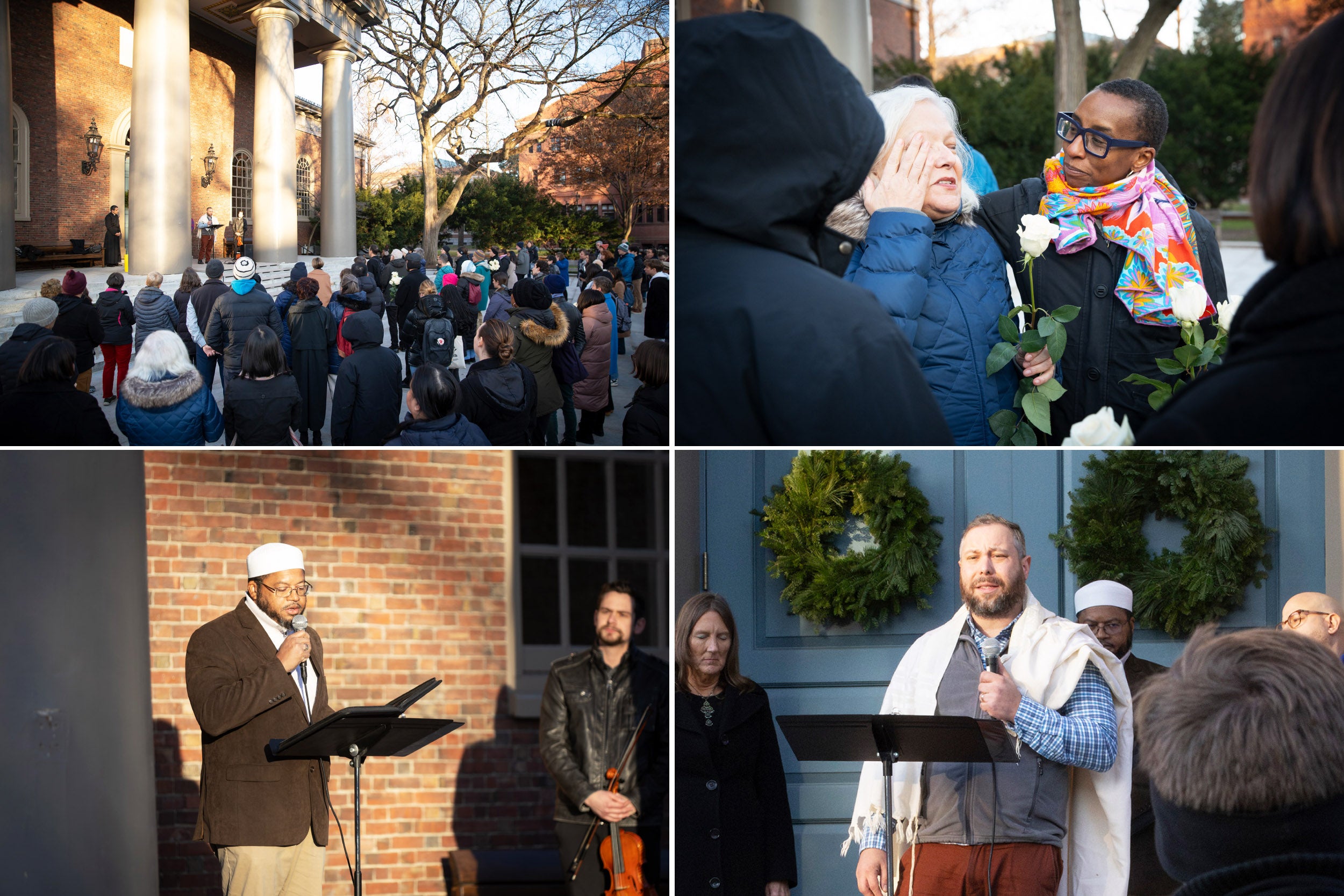
Members of the community [clockwise from top left], including Harvard President Claudine Gay, attended an interfaith vigil Friday on the steps of Memorial Church to grieve for victims of the violence in Israel and Gaza. Rabbi Getzel Davis and Imam Khalil Abdur-Rashid were among the chaplains who offered prayers.
Photos by Niles Singer/Harvard Staff Photographer
‘It is an act of courage to stand with others.’
Reminders of common humanity, rooted in grief and hope, mark vigil led by Harvard chaplains
Invoking the shared suffering of the Israel-Hamas war, Harvard chaplains on Friday held an interfaith vigil on the steps of Memorial Church to give members of the campus community a chance to come together amid a time of wrenching grief.
Led by the Rev. Matthew Ichihashi Potts, Pusey Minister in the Memorial Church and Plummer Professor of Christian Morals, the event included prayers by five chaplains and a musical meditation. About 150 people attended, including President Claudine Gay.
The terrorist group Hamas killed more than 1,000 Israelis in a surprise attack on Oct. 7, triggering a war that has left thousands dead in Gaza. In recent weeks, campus religious leaders have sought to provide comfort and support to students, faculty, and staff stricken by trauma and loss. The vigil was an attempt to provide a space for the community to recognize common humanity in common anguish.
“In times of acute pain, of deep division, of harrowing traumas and relentless retraumatizations, it is an act of faith to gather with strangers,” said Potts. “It is an act of courage to stand with others. It is also a deeply human act to be willing to grieve, to try and see your grief reflected in another’s, to try to bear another person’s grief as your own, to try and let another person bear yours.”
He noted in the faces surrounding him a depth of emotion that tested the ability of language to communicate and connect.
“In gathering to speak, in trying to speak despite the certainty of our failure — in trying to speak to one another, here and now, to speak to one another of our fear and our anguish and our rage and our sorrow and our shame and our despair, we place our faith in the possibility of human connection,” he said. “We place our faith in the possibility that we might somehow cross the distances that divide us, even if we cannot close those distances now, even if we cannot imagine how we ever will. Our failing words might yet echo across these awful chasms, and we might listen and be heard.”
Jewish and Muslim leaders have been working privately to support their communities, said Tammy McLeod, president of the Harvard chaplains, whose number includes 30 faith leaders representing many religions. The vigil was an opportunity for different groups to “weep with those who weep,” she said in her remarks.
Imam Khalil Abdur-Rashid, Muslim chaplain, prayed that the Harvard community would join to mourn all who perish in the war.
“Our Lord, we come before you united in our humanity and united in pain and grief,” he said. “We are deeply angry, and we grieve profoundly for the loss so many of us have witnessed and experienced; we grieve for the severity of constant loss of innocent life in this time of war.
“We mourn the senseless loss of babies, of children, of women, of Palestinian lives, of Muslim lives, of Jewish lives, of Christian lives, of all innocent human life, because of this war.”
In his prayer, Rabbi Getzel Davis, Hillel chaplain, reminded the crowd of the commandment that we love the stranger.
“May this love be a salve at this terrible time,” Davis said. “No matter what language we pray in or which holy books we study may we find solace in your loving embrace… May each of us see the human eyes before us regardless of our religions, political beliefs, and various differences that bring so much to our world. You created them all. May we see in each other another facet of your divine face.”
At the end of the gathering, Humanist Chaplain Greg Epstein made clear what’s at stake in the choice between reaching out or lashing out.
“It is only human to feel our own group’s agony and suffering and to scream out our legitimate and serious grievances,” said Epstein. “And yet to deepen what it means to be human in a future worth building, we will one day need to tend to the wounds of those with whom we do not closely identify. The future depends on feeling each other’s grief. The world needs us to grieve, together.”
After Epstein concluded all in attendance received a white rose from the chaplains “in remembrance of their dead and in honor of their grief.”




